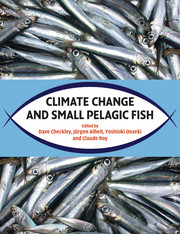Book contents
- Frontmatter
- Contents
- Acknowledgments
- List of abbreviations
- List of contributors
- Foreword by Jorge Csirke, Michael Glantz, and James Hurrell
- Preface
- 1 History of international co-operation in research
- 2 A short scientific history of the fisheries
- 3 Habitats
- 4 Variability from scales in marine sediments and other historical records
- 5 Decadal-scale variability in populations
- 6 Biophysical models
- 7 Trophic dynamics
- 8 Impacts of fishing and climate change explored using trophic models
- 9 Current trends in the assessment and management of stocks
- 10 Global production and economics
- 11 Human dimensions of the fisheries under global change
- 12 Mechanisms of low-frequency fluctuations in sardine and anchovy populations
- 13 Research challenges in the twenty-first century
- 14 Conjectures on future climate effects on marine ecosystems dominated by small pelagic fish
- 15 Synthesis and perspective
- Index
10 - Global production and economics
Published online by Cambridge University Press: 08 January 2010
- Frontmatter
- Contents
- Acknowledgments
- List of abbreviations
- List of contributors
- Foreword by Jorge Csirke, Michael Glantz, and James Hurrell
- Preface
- 1 History of international co-operation in research
- 2 A short scientific history of the fisheries
- 3 Habitats
- 4 Variability from scales in marine sediments and other historical records
- 5 Decadal-scale variability in populations
- 6 Biophysical models
- 7 Trophic dynamics
- 8 Impacts of fishing and climate change explored using trophic models
- 9 Current trends in the assessment and management of stocks
- 10 Global production and economics
- 11 Human dimensions of the fisheries under global change
- 12 Mechanisms of low-frequency fluctuations in sardine and anchovy populations
- 13 Research challenges in the twenty-first century
- 14 Conjectures on future climate effects on marine ecosystems dominated by small pelagic fish
- 15 Synthesis and perspective
- Index
Summary
Summary
Global production and trade in small pelagic fish (SPF) are affected by complex interactions between physical, ecological and economic systems, which give rise to relatively long-term, asynchronous cycles in SPF abundance and distribution. These cycles can have serious impacts on local SPF fisheries' production, but because they tend to be counterbalancing, global production of SPF tends to remain relatively stable. Nevertheless, recent patterns of landings indicate that most SPF are being harvested at or near their maximum yield levels, which in the face of increasing demand is expected to result in rising prices in supply-limited markets. Adding to these concerns are the uncertainties of climate change, which leads us to consider important economic issues related to SPF fisheries production, starting with how the redistribution of SPF resources affects respective rates of resource utilization, particularly when SPF move between independently managed fishing zones. This entails an associated issue, the time preferences for experiencing the range of benefits from SPF resources among nations sharing access to these resources. Because the ecological and economic impacts of climate change will extend well beyond directed SPF fisheries, we consider the economic impact of a climate–SPF regime shift from an ecosystem perspective. Of interest here is the full range of economic benefits SPF resources provide; not only their commercial value, but as prey for commercially valuable predators, and for recreational and non-commercial predators. In this context we examine the socially optimum use of these resources, balancing the benefits from commercially harvesting SPF with those from leaving them in the ocean ecosystem.
- Type
- Chapter
- Information
- Climate Change and Small Pelagic Fish , pp. 256 - 274Publisher: Cambridge University PressPrint publication year: 2009
- 7
- Cited by



